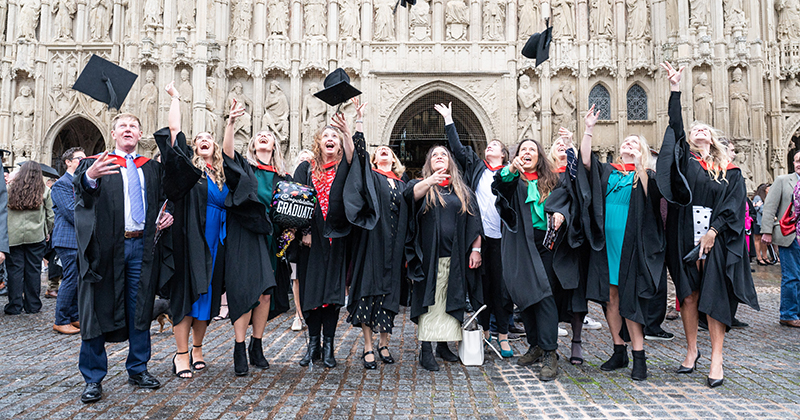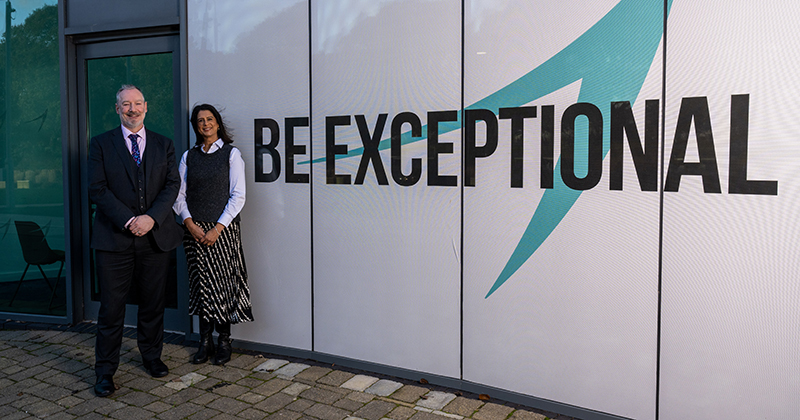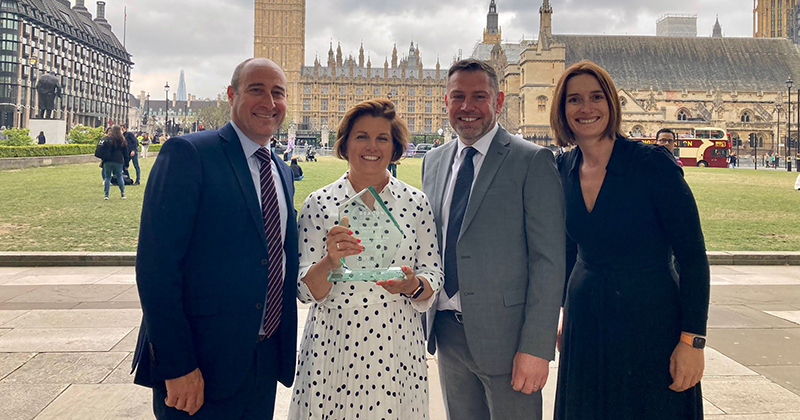Exeter College has become the first college to retain its ‘outstanding’ grade and achieve top marks in the new skills contribution measure from Ofsted. Tallulah Taylor finds out how they did it.
An unexpected influence on John Laramy, the principal of Exeter College, is Terry Leahy, who was chief executive of Tesco in the supermarket giant’s prime in the late 1990s.
Despite needing to make huge profits every year, Laramy explains that Leahy would spend half a day each week in stores, talking to customers and learning what it was like to shop there.
Being in touch with students and staff is therefore a big part of Laramy’s leadership approach, which this week delivered Exeter’s second ‘outstanding’ Ofsted result in 10 years.
The first result, in 2014, came under the leadership of Richard Atkins, Laramy’s predecessor who, after retiring as principal in 2016, became the FE Commissioner.
At that time, then education secretary Michael Gove introduced a rule that exempted schools and FE providers judged ‘outstanding’ from further inspections. The exemption survived until September 2021, when concerns were raised about providers going 10-plus years without scrutiny.
Of the 35 previously ‘outstanding’ FE providers to have been inspected since then, 22 have declined by at least one grade.

Laramy has led Exeter for the past seven years through the turbulence of policy change, funding restraints and, of course, the Covid 19 pandemic – all of which have been blamed by other providers who have struggled to get top marks from Ofsted inspectors.
The Exeter report refers to the “nurturing and supportive environment”, with high-performing students taught by staff who act as “exemplary role models” to the learners.
Laramy tells FE Week: “The senior leadership team and I, alongside the governors, work really hard to listen to students and apprentices so that we know what it’s like to be a student or an apprentice here. I think that sort of culture really does have an impact across the college.”
Exeter received ‘outstanding’ judgements for every category inspected, apart from in their provision for learners with high needs, for which the college was graded ‘good’.
Top marks were also awarded for the new skills contribution measure which was introduced in September, making them the first both to retain an ‘outstanding’ grade and be judged ‘strong’ in meeting local skills needs.
Praise for the curriculum, sequencing, dedicated support and extra-curricular activities – among many other qualities – is scattered throughout the report, indicative of a caring and safe culture across the college campuses.
“Our teachers are absolutely amazing and go above and beyond”
Their high-achieving culture starts at the top, Laramy says. The college governors set high expectations of the senior leadership team which are then replicated across the college.
The vision is for the college to be exceptional, something which Laramy thinks reflects the standards they expect from their students, many of whom travel considerable distances to attend.
Vice principal Jade Otty supports this idea. She says that, when you work somewhere that is aspirational, alongside enough other people with similar aspirations, “you get into a positive spiral of this kind of culture”.
The report praises teachers and staff for valuing all members of the college community and describes them as “exceptional role models”.
“Our teachers are absolutely amazing and go above and beyond,” Otty says. “They will put on bespoke sessions for students, whether that’s revision or catching up.
“They are really good at assessing their curriculum and their delivery and asking, ‘how am I doing’ and ‘what do we need to have extra support’ in this and that.”
This attitude is part of the established teaching practice at Exeter College, Otty believes.
“You don’t just teach things in a particular order at a particular time because that’s what you thought you were going to do a few weeks ago or a few months ago.
“They’re dealing with human beings. They look at how their learners are getting on and change their curriculum accordingly.”
Laramy meets all his staff from right across the college four times a year to find out what they are doing brilliantly what they could do better. And he thanks any that are doing a fantastic job. They also have staff award celebrations and a similar model for students.

Meeting skills needs through the community
The college fares “exceptionally well” in how they identify and meet the local skills needs of employers, according to the inspectors.
Deputy chief executive Rob Bosworth explains that “exceptional colleges shape the landscape with the community. It didn’t happen because of one conversation. It has been built over time.”
Bosworth has been building these partnership relationships over 20 years through speaking with employers as well as to local community members and industry groups like the chamber of commerce.
“The way we do it is we live and breathe everything in the community. Colleges are there to serve the needs of the community. To do that at an amazing level, they have got to be embedded into the community on a day-to-day basis.”
He works with Otty on teaching and learning, which is a “purpose-driven curriculum strategy” that has a line of sight to industry and next-step progression.
Every piece of the curriculum is co-designed with an employer or partner stakeholder to ensure they are shaping the landscape alongside the different industries.
But it is not all about the hard skills needs that you read about in skills plans or economic strategies. Exeter’s work with Devon County Council to meet the needs of non-English speaking residents of the area also won praise in the report.
Inspectors emphasised how leaders quickly recognised the challenges for Ukrainian refugees and created courses “to support this community and help them become active citizens”.
The college’s relationship with stakeholders is notably successful in improving opportunities for those who are the most disadvantaged in the community.
Bosworth explains that they used their community learning budget to create an urban Learning Academy with partners who helped to design the curriculum to re-engage those that are furthest away from learning.
“So, we’ve done everything from sitting in the library playing Monopoly for adults that struggle with GCSE maths. We’ve done courses in bibliotherapy, where parents that are struggling to read to their children can come into a course and learn how to teach their children to read.”

High needs ‘particularly challenging’
The only area in which the college did not achieve ‘outstanding’ was in the provision for learners with high needs.
Ofsted found that the specific courses designed for these learners was not sufficiently challenging and ambitious and was not sufficiently personalised to meet each learner’s needs.
Why doesn’t the high expectations culture set at the top seem to reach those with additional needs?
Laramy responds that they are in the throes of opening a new building to accommodate high-needs learners, and that getting ‘good’ at this point for high needs provision is a “pretty stellar grade” when “you read what’s going on out there”.
“High-needs provision is a particularly challenging area now, which is well publicised nationally, the challenges with funding and so forth behind the students… We are not a – and cannot be – a specialist high-needs college…
“I think one of the areas that the government is thinking about carefully is investing in additional specific high-needs providers. Because, as I understand it, there’s quite a shortage of high-needs places across the country. So, I think we are part of the solution to that, but not the total solution.”
Despite offering help with the cost of living, training and offering professional development to teachers, one of Laramy’s main challenges is attracting and retaining his staff.
“It’s my job to ensure we pay them as much as we can afford,” he says. “But it’s not just about paying. It’s making sure they feel that it’s a supportive workplace, that they get developed, that they get to teach in a great space.”

T Levels are not part of that challenge. Laramy enthusiastically says the college has outstanding T Level provision, and he wished they were assessed this year.
Asked if they will need to do make any changes to achieve another ‘outstanding’, Laramy says that, although they had been out of scope for an inspection for many years, they did not actually do anything differently then.
He refutes the idea that ‘outstanding’ colleges know how to work the system to keep the inspectors happy.
“That’s the thing I’ve reflected on, having Ofsted come to visit. Even if they didn’t exist, I don’t think we would do much different as a college. And I think that is probably what the report reflects.”

















Your thoughts